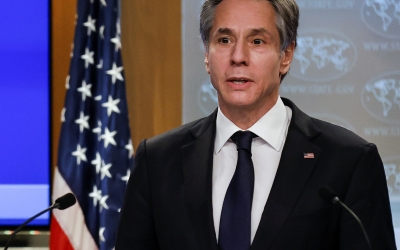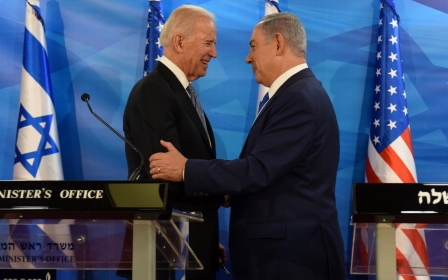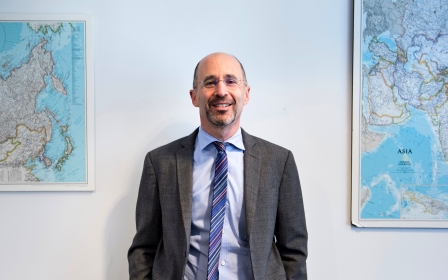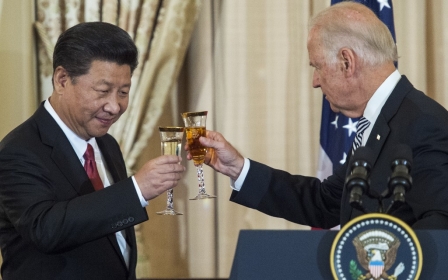Iran's Zarif says time for US to return to nuclear deal is 'not unlimited'
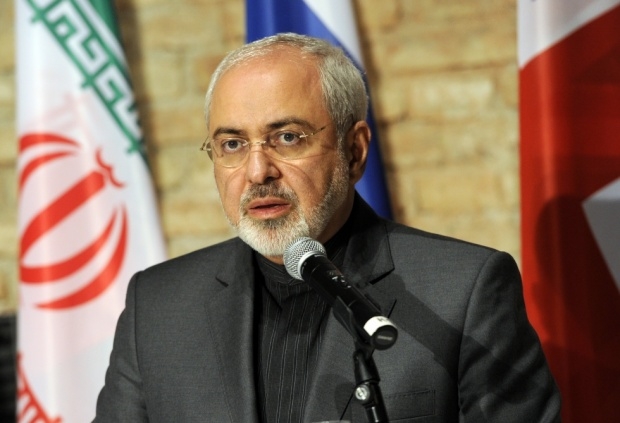
Iranian Foreign Minister Mohammad Javad Zarif has warned the United States that time for a possible return to the nuclear deal is "not unlimited", urging President Joe Biden against following the "failed policies of the Trump administration".
In an interview with CNN on Monday, Zarif reiterated Tehran's position that it can "immediately" return to compliance with the agreement if the US lifts its sanctions.
Tehran has been loosening its commitment to the pact since Washington nixed the deal in 2018, but Zarif said Iran's decreased compliance is a response to the US withdrawal and that it was still in accordance with the rules of the agreement.
"The United States is not in the nuclear deal. And it's not in the nuclear deal because of its own decision to withdraw," Zarif said.
He called on Biden to "implement executive orders" to lift sanctions on various sectors of the Iranian economy, including oil, banking and transportation.
The Iranian parliament has passed a law to restrict the access of inspectors from the UN nuclear watchdog (IAEA) to the country's nuclear facilities if US measures are not lifted by 21 February. Iran will also hold a presidential election in June.
Zarif stressed the significance of that deadline on Monday. "Iran has the strictest IAEA inspection mechanism anywhere in the world... We will be limiting that, but there is a very easy way of addressing it, and that is for the United States to come back into compliance before that date. That date is an important day."
Zarif responds to Blinken
Earlier on Monday, NBC released written excerpts from an interview with US Secretary of State Tony Blinken, in which the top American diplomat is reported to have said that Iran is shortening the time it needs to acquire enough enriched uranium for a weapon.
The news network quoted Blinken as saying that Tehran is months away and could be "within weeks" of reaching that stage if it continues to loosen its commitments to the pact.
'If we wanted to build a nuclear weapon, we could have done it some time ago'
- Mohammad Javad Zarif
However, it was not clear from the preview of the yet-to-fully-air interview what Blinken meant exactly by his comment, and if the timeline he projected is under the current circumstances or under further possible breaches by Iran.
Still, Zarif was told by CNN that his American counterpart had said that Iran was "weeks away from having enough enriched uranium for a nuclear weapon."
In response, the Iranian foreign minister categorically denied that Iran is looking to build a nuclear weapon.
"Iran does not seek a nuclear weapon," Zarif said. "If we wanted to build a nuclear weapon, we could have done it some time ago. We decided that nuclear weapons will not augment our security and are in contradiction to our ideological views."
The US State Department released a transcript of the interview later on Monday, showing that Blinken was warning against the effects of the possible escalation of Iran's nuclear programme, which he said could eventually reduce the time needed for Iran to amass enough enriched uranium for a weapon to a "matter of weeks".
"It’s a problem that could get more acute because if Iran continues to lift some of these restraints imposed by the agreement," Blinken said.
He also stressed that having enough nuclear fuel, known as fissile material, for a nuclear bomb is different than actually acquiring a weapon that is able to detonate.
Biden has repeatedly said he will try to reinstate the nuclear agreement if Iran must return to full compliance with the pact.
Zarif said efforts to return to the deal can be coordinated and synchronised, but he rejected putting the onus on Tehran to make the first move.
"We have shown that we fulfil our promises. The side that has not been able to show that it fulfils its promises has been the United States," Zarif said.
'Strict limitations'
The multilateral agreement, known as the Joint Comprehensive Plan of Action (JCPOA), saw Iran scale back its nuclear programme in exchange for lifting sanctions against its economy.
Former US President Donald Trump pulled Washington from the deal in 2018 and started piling sanctions against Tehran as part of his "maximum pressure" campaign.
In response, Tehran has started enriching uranium beyond the limits imposed by the deal.
"If we are away from the strict limitations of the nuclear agreement, it's because the United States tried to impose a full economic war on Iran," Zarif said on Monday.
"Now, [if] it stops that, we will go back into full compliance."
The Iranian foreign minister also dismissed talks of renegotiating the deal or expanding its scope to address Iran's regional activity or ballistic missile programme. Biden and his aides have vowed to work towards a "longer and stronger" accord.
He said the JCPOA only addressed Iran's nuclear programme in 2015 because the US was not willing to discuss its own role in the Middle East, including arms deals with Gulf countries.
"Is the United States prepared to stop selling arms to our region if it wants to talk about our defence? We spend a seventh of Saudi Arabia on defence with two and a half times its population," Zarif said.
Middle East Eye propose une couverture et une analyse indépendantes et incomparables du Moyen-Orient, de l’Afrique du Nord et d’autres régions du monde. Pour en savoir plus sur la reprise de ce contenu et les frais qui s’appliquent, veuillez remplir ce formulaire [en anglais]. Pour en savoir plus sur MEE, cliquez ici [en anglais].



